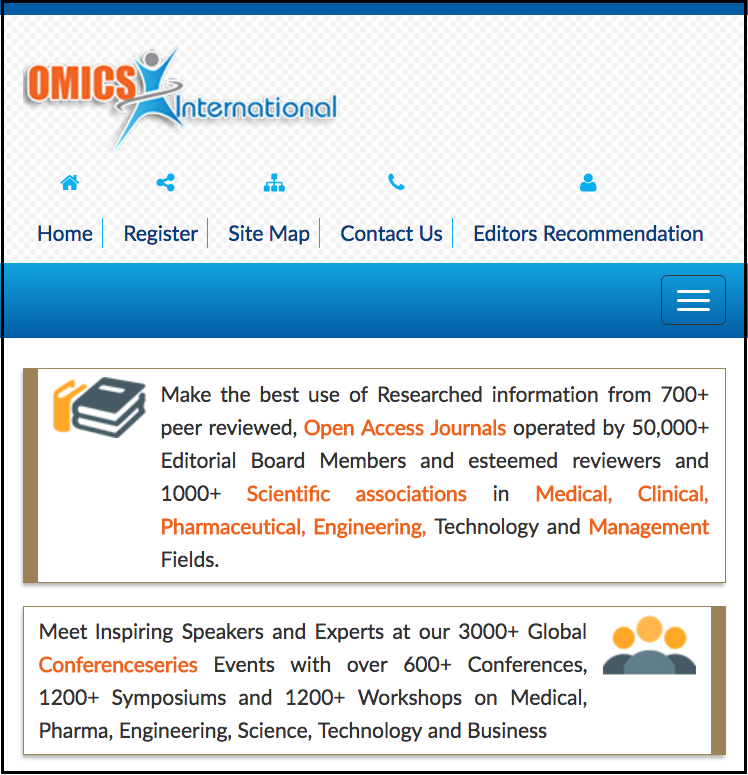FTC Files Charges Against OMICS Group
For the first time, the Federal Trade Commission is going after what it considers to be a predatory publisher of scientific journals. The agency is charging OMICS Group, an India-based, Nevada-incorporated conglomerate — along with its president and director, Srinubabu Gedela, and two affiliated companies, iMedPub LLC and Conference Series LLC — with misrepresenting the legitimacy of its publications, deceiving researchers, and hiding publication fees.
OMICS International, which is registered as OMICS Group in Nevada, is described on its website as a publisher of “700+ leading-edge peer reviewed, open-access journals,” and an organizer of “over 1,000 scientific conferences all over the world.” But Jessica Rich, director of the FTC’s Bureau of Consumer Protection, described the company differently in a press release announcing the agency’s action late last week. “The defendants in this case used false promises to convince researchers to submit articles presenting work that may have taken months or years to complete,” Rich said, “and then held that work hostage over undisclosed publication fees ranging into the thousands of dollars.”
Neither OMICS Group nor Gedela responded to repeated requests for an interview. After this item was published, however, Gadela responded by email and pointed to a published “response” to the FTC’s charges. In that sometimes meandering and dramatically-worded document, Gadela claims that the FTC lacks jurisdiction in the matter, and that its approach to the suit “smacks of deliberate circumvention of the process laid down by the law.” The missive also goes on to deny virtually all of the agency’s claims, calling them, in turns, “baseless,” “completely wrong,” or “invalid.” Some charges were described as mere “misunderstandings.”
So-called predatory journal publishers exploit the open-access publishing model by establishing new and authoritative-sounding, open-access journal titles, and then directly soliciting submissions from scientists. Once submissions are received and published — typically with little or no real peer review — the publisher demands exorbitant and often hidden fees from the researcher. OMICS is just one of many publishers that have begun producing an ever-expanding collection of such obscure journal titles in recent years. Jeffrey Beall, a librarian at Auraria Library, University of Colorado Denver who maintains a highly regarded annual list of 1,000 “potential, possible, or probable predatory scholarly open-access publishers,” has frequently criticized OMICS Group and its various iterations.
“[T]he open-access publisher OMICS International completely sucks,” Beall wrote on his blog in July. “The stark language here is justified, I believe, by the abusive, exploitative, and unethical actions that OMICS International has engaged in against honest researchers.”
Ioana Rusu, the lead attorney for the FTC, said it was time for the agency to respond to these and similar complaints. “We have really seen mounting calls for someone to step in and do something in this area,” she said. “We really see it as part our bread-and-butter mission here. Our job is to protect consumers from deceptive practices in the marketplace and that is really in whatever form they come in.”
The FTC claims that OMICS and its affiliates target less-experienced researchers, often through direct contact and aggressive soliciting. The company improves its odds of luring unwitting researchers, the FTC charges, by listing prominent researchers as being among its journal editors, even though many of these editors have not agreed to work with OMICS titles. Once a researcher does submit a paper to an OMICS journal, the FTC says the publisher performs, at best, a perfunctory peer review, after which it charges “hundreds to thousands of dollars” in fees.
Federal authorities also charge that OMICS falsely claims that its journals are indexed by several federal research databases, including PubMed and MEDLINE, and that its affiliates arrange conferences — for which participants often pay over $1,000 in attendance fees — by falsely advertising appearances by highly recognized researchers, many of whom were wholly unaware of the conferences.
“No one really quite knew where to complain and what to do about it, and who to call,” Rusu said. “I think so far we have gotten a very positive reaction [from researchers] for stepping into this space, drawing a line in the sand, telling the industry ‘We’re watching you. We’re here. We’re looking at your practices.’”
In a phone call, Beall said OMICS had recently begun an aggressive email campaign in order to drum up more business. “A lot of people — researchers — have a manuscript sitting on their computer that might have been rejected from another publisher,” Beall said. “They get the spam email and they think, ‘well, I’ll just send it to them,’ without putting much effort into investigating the publisher, and OMICs knows that.”
The FTC is asking a U.S. District Court in Nevada to order OMICS to return money to researchers, freeze OMICS Group’s assets and “[a]ward such relief as the Court finds necessary to redress injury to consumers.”
In the company’s response letter, Gedela suggests that the FTC is discriminating against open-access publishers, and working instead on behalf of subscription-based journals “who are earing [sic] Billions of dollars rom [sic] scientists [sic] literature.” He also insists that the agency drop its proceedings, and threatens to “to seek for damages for loss of repute and malicious prosecution.”
Beall says that he has seen the number of these predatory journals grow over the years — and along with them, the number of victims emailing him asking for help.
“I hear all of these stories about how these poor people are trapped, and they are often young people from developing countries,” said Beall. “Their careers are just starting, their paper has been published in a predatory journal and they are worried that it is going to hurt their career and ruin their whole career, and they don’t know what to do, and so they email me.
“I see firsthand a lot of the damage that these predatory publishers do,” Beall added, “and how they hurt people.”
This post has been updated to include details from the formal response by OMICS Group to the charges leveled against it by the Federal Trade Commission.











